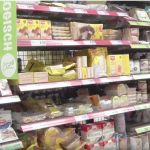Ghana: sending relations home in Style
Posted by By Akogun Akomolafe at 22 March, at 20 : 50 PM Print
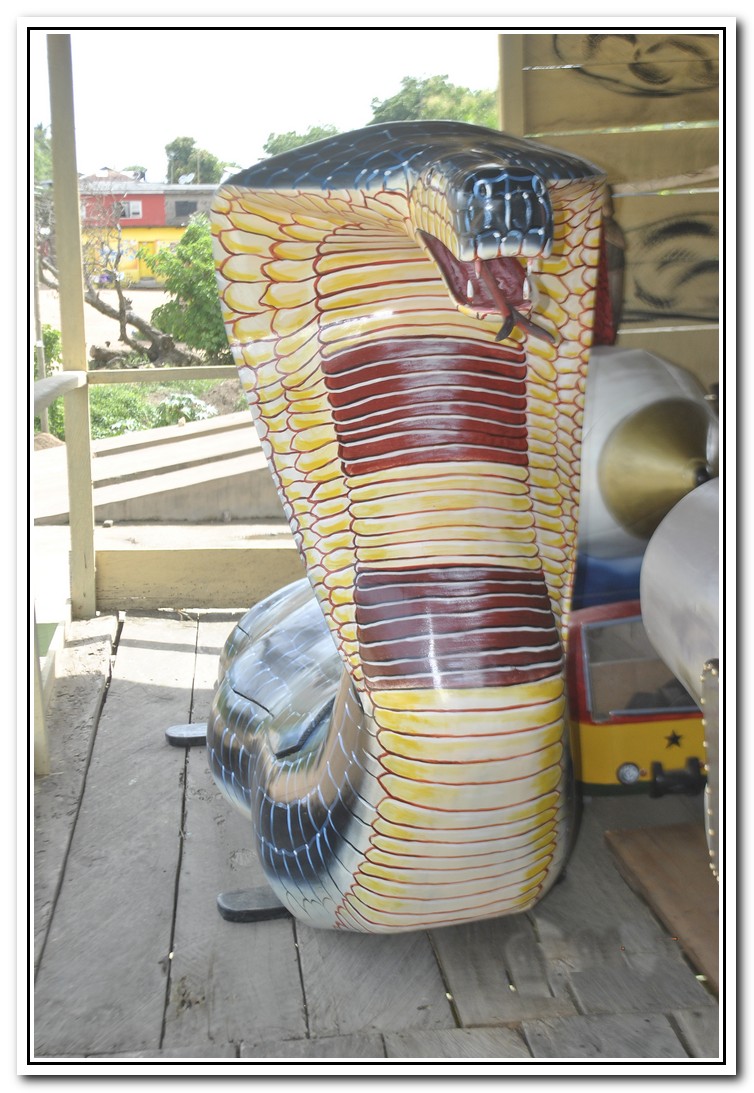
Warning: count(): Parameter must be an array or an object that implements Countable in /home/alaye/public_html/wp-content/themes/Video/single_blog.php on line 56
Funerals are big, very big business in Africa. For reasons that remain largely incomprehensible, Africans put lots of premium on organizing lavish funerals.
No one can say that we Africans are not funny animals.
In years past, we used to pride ourselves on our strong sense of community. In those foregone days, our extended family system was the envy of the world. We truly cared and catered for evey member of our society.
Alas, today, we have abandoned the practice of taking care of members of our family.
Nowadays, far be it for us to take proper care of our relations when they are alive. And heaven forbid that we show concern when they are sick. As they lay on their sick beds, we will have every reason not to visit them. We have become too ‘civilised’ to bother ourselves with thinking beyond our nuclear (immediate) family. But as soon as these relations die, we scramble to give them ‘befitting’ (of what, we never ask) burials.
At the expensive funerals we organize for relations that died in penury, we go into great debt to provide food the likes the deceased never tasted, and we procure expensive drinks with price tags like telephone numbers. We will buy expensive caskets for the person that probably died sleeping on a mat, and we will hire the biggest and longest limousines to chauffeur the dead who rode only in trotros (matatus in Kenya) in her entire life.
So like the good people we are, every weekend we abandon all and troop to our villages to send relations away with great fanfare. It is not unknown for families to go into huge debt in order to provide a lavish funeral for departed relation they didn’t care for. In some parts of Ghana, many enterprising people have turned themselves into “Funeral Consultants.” They take charge of organizing funerals on behalf of indigent families with the expectation of making a profit from donated money.
At these funerals, we consume too much food and drank more liquor than is good for us. We dance ourselves silly and fornicate like the ancient people of Sodom and Gomorrah. Fueled by enough ethanol to launch Inter-continental Ballistic Missiles, many will get into their vehicles and drive themselves into their untimely death, necessitating more funerals.
Africans put a lot of stock in giving departed relations funerals they think befit the departed, and will sufficiently wow neighbours and become the envy of friends for long time.
Of course, about the only thing the dead take along in their solitary journey is the coffin in which they are buried. So, people have come up with ingenious and creative ways to bury dead relatives in coffins that depict their lives on earth. These coffins are shaped to closely resemble the profession or vocation of the dead.
In Ghana, coffin makers have notched up the scale with incredible artistry as depicted in the following pictures. Each of the coffins clearly depict the profession of the dead.
Beer Bottle
In Ghana, many people get their entertainment from Beer Parlour. These are usually small kiosks that serve beer, soft drink and liquor. Some of the joints also provide small eateries and grilled meat. The joints serve great social needs of the community. Sometimes the landlords will put a Television to allow people to gather and watch their favourite TV programeme or sports, especially football.
Many people make appointments to meet at these as it affords them the anonymity necessary to discuss business as well as intimate affairs.
Beer parlour owners whose relations can afford it are buried in coffins shaped like a bottle.
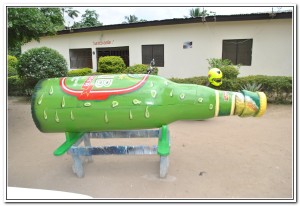
Church
Coffins in the form of churches are made for priests and church officials of good standing. Religions continue to play important roles in Africa and ‘men of god’ are important people in society.
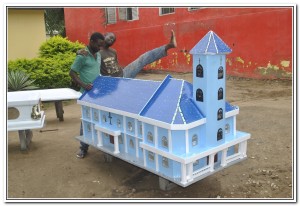
Cockerel coffin
Many families have birds and animals as their totems. These form part of the family Coat of Arms.
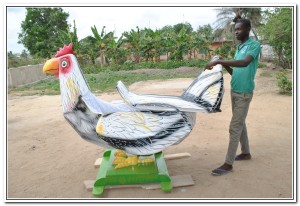
Energy Drink
Coffins shaped like Energy-drinks suggest that the occupant was a notable Athlete in his lifetime.
This is said to be a new addition and is said to be popular among athletes and some people who sell those type of drinks.
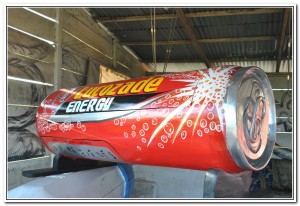
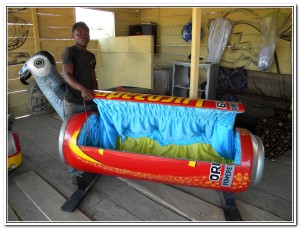
Fire-service truck
This shows clearly that the dead was an officer of the Ghana Fire Service.
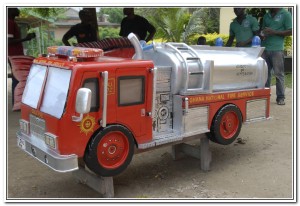
Football Boot
Football is not only the most popular sport in Ghana, but it has afforded many Ghanaians, from the rural parts, to lift themselves up from grinding poverty. Many people who never dreamt of becoming rich have become stupendously wealthy – thanks to football.
Many footballers elected to be buried in boot-shaped coffins in order to pay homage to the game that enable them enjoyed the good things in life.
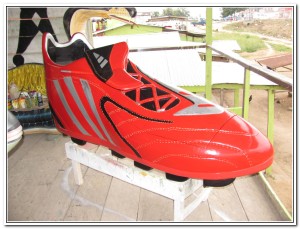
Hair dryer
Ghanaian women put a lot of stock in their appearance. It is not unusual for women in Ghana to spend hours, even days, coiffuring their hair into shapes that will dazzle even the most adept mathematician.
One of the most beautiful things in the country is the profusion of elegant hairstyles by the women.
Many of the owners of the Beauty Salons have become stupendously rich.
Many of them chose to be buried in a tool that depict the trade they plied in life.
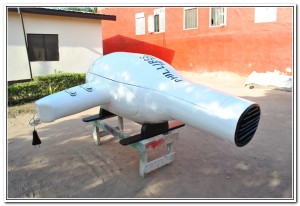
Lorry
Because of the poor rail and air transport infrastructures, automotive vehicles, especially Lorries, remain the most popular mode of transport in much of Africa.
They are used to transport both goods and human cargoes. Many rural parts of Ghana, including the most fertile agricultural lands, are connected only by Lorries. So, lorry drivers play very important roles are well regarded in societies.
It takes years of apprenticeship before one becomes a Master Driver.
Since there are no retirement age or pension, many drivers get to drive their vehicles to very advanced age. It goes without saying that they become very attached to their vehicles.
And what better way to bid a Master Driver the Final Farewell than to send him off in a coffin in the shape of what he was used to in most of his life?
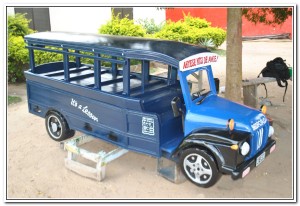
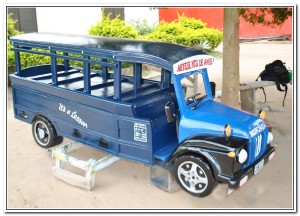
Plane
It is not clear if plane-shaped coffins are for airline pilots, frequent flyers or people with desire, but didn’t manage to get onto a plane in their lifetime.
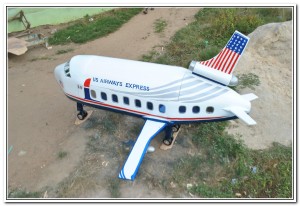

Pregnant woman
This type of coffins is made for mid-wife who are considered very important pillars of their societies. Before the advent of Western medicine, mid-wives in Africa played more than the role of helping to deliver babies. They also functioned as ante and pre-natal specialists, as well as the local gynecologists. They were also competent herbalists who could take care of the medical needs of mothers and small children. Most of them inherited the profession from their mothers who got it from their own mothers.
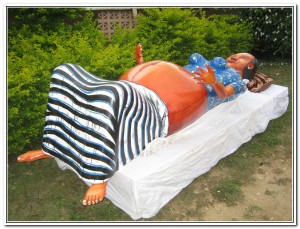
Sewing machine
No matter the level of poverty, Ghanaians love to dress to kill. Everyone want to stand out in the sartorial department. The abundance of fashion on the streets, even in the poorest part of town, is truly staggering.
Professional Tailors and Sew-mistress always manage to craft the most complicated designs from simple fabric.
Coffins in the shape of sewing mistress tell the tale that the occupant was once a noted professional in the cloth-sewing business.
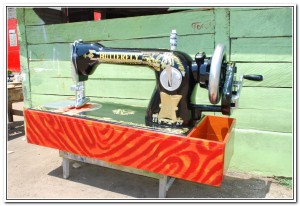
Leopard
Tigers (Leopard) are regarded as the most royal of cats. Only the Royal family or a very outstanding family are allowed to use Tigers as emblems in their coat of arms.
A Tiger coffin clearly show that the departed is a royal or a most important person in the community.
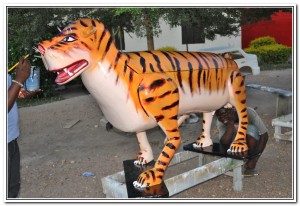
Tipper Truck
In Ghana, Tipper trucks are used to ferry sand and stones to building sites. These trucks are driven by drivers with many years of experience. In many instances, the drivers belong to associations that are very strong in fighting for the rights of members.
It is the unions that usually organize the funerals for its dead members. They will organize that the hearse carrying the departed is accompanied by many trucks adorned with red strips of cloth and plastered with pictures of the dead. They will make loud dins as they snake their way to the cemetery.
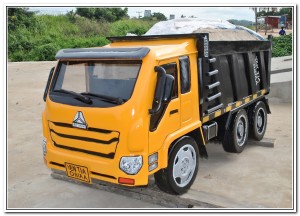
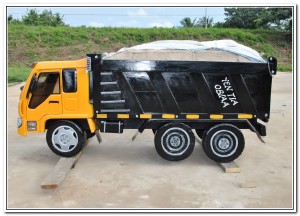
Chat with an Apprentice
One of Ghana’s most popular fancy coffin workshop is located at Breku in the Central Region. The town lies on the ECOWAS Transnational Highway, about 40kilometers from the Ghanaian capital, Accra.
Douglas is the Chief Apprentice. He runs the shop’s affairs, and oversees about eight junior apprentices.
In a chat, Douglas disclosed that he decided on the carpentry vocation because his father, a poor farmer in the nearby town of Bawjiase, cannot afford to send him to school. He is slated to pass out (graduate) in February this year, after serving the mandatory five years apprenticeship. Douglas has already completely mastered the art of carpentry, including making coffins of any design, however complex.
Douglas said that no formal education is required to become a successful coffin maker – almost all the apprentices are school-drop out.
“People bring their own designs and we just make it for them.” Douglas said with a boyish grin as he showed off a wooden Army Knife which he said a Swiss Diplomat commissioned. “No, we don’t use any design or draw anything on paper. The customer tell us what they want and we build it or them.”
Prices of the coffin range from GH₵2,000 upward (1 euro = GH₵4). It is a very lucrative business, but it requires startup capital. And that is where apprentices like Douglas comes into grief. They don’t have the money to start their own business and many of them end up doing odd jobs to survive.
Asked what his plans are, Douglas studied the floor before he replied: “It is difficult to think about the future. Of course, it is important, but it troubles me a lot to think about it. I graduate this month end, but I might have to go and help my father in his farm, as I don’t have the money to start my own shop. Maybe after working for some years, I can get enough money to rent a shop, buy some equipment and start my own coffin-making business. I know I can make it; I am a good worker.”
Douglas laughed when asked if he has approached the bank for loan to start his business. “The banks lend money only to rich people. They will laugh in my face if I ask them for loan. And from where am I going to get the returns to pay them back the interests they charge? There is a lot of demand for the coffins. We get orders from abroad, from white men, even. So, it can become a good source of money for the country, unfortunately we are handicapped by lack of start-up capital.”
About the Author
Femi Akomolafe is a passionate Pan-Africanist. A columnist for the Accra-based Daily Dispatch newspaper and ModernGhana, and Correspondent for the New African magazine, Femi lives in both Europe and Africa, and writes regularly on Africa-related issues for various newspapers and magazines.
Femi was the producer of the FOCUS ON AFRICANS TV Interview programme for the MultiTV Station.
He is also the Man and Machine Coordinator at Alaye Dot Biz Limited, a Kasoa-based Multimedia organisation that specialises in Audio and Video Production. He loves to shoot and edit video documentaries.
His highly-acclaimed books (“Africa: Destroyed by the gods,” “Africa: It shall be well,” “18 African Fables & Moonlight Stories” and “Ghana: Basic Facts + More”) are available for sales at the following bookshops/offices:
- Freedom Bookshop, near Apollo Theatre, Accra.
- The Daily Dispatch Office, Labone – Accra
- WEB Dubois Pan-African Centre, Accra
- Ghana Writers Association office, PAWA House, Roman Ridge, Accra.
- African Kitchen in Amsterdam Bijlmer
Where to buy them online:
On Lulu Books:
18 African Fables & Moonlight Stories https://goo.gl/Skohtn
Ghana: Basic Facts + More: https://goo.gl/73ni99
Africa: Destroyed by the gods: https://goo.gl/HHmFfr
Africa: It shall be well: https://goo.gl/KIMcIm
Africa: it shall be well
on Kindle books: https://www.createspace.com/4820404
on Amazon books: http://goo.gl/QeFxbl
on Lulu Books: https://goo.gl/SQeoKD
Africa: Destroyed by the gods
on Kindle books: https://www.createspace.com/4811974
on Amazon books: http://goo.gl/1z97ND
on Lulu Books: http://goo.gl/KIMcIm
My Lulu Books page: http://www.lulu.com/spotlight/FemiAkomolafe
Get free promotional materials here:
- Africa: it shall be well: http://alaye.biz/africa-it-shall-be-well-introduction-in-pdf/
A FREE Chapter of ‘Africa: It shall be well’ could be downloaded here: http://alaye.biz/africa-it-shall-be-well-a-free-chapter/
- Africa: Destroyed by the gods (How religiosity destroyed Africa) http://alaye.biz/africa-destroyed-by-the-gods-introduction/
A FREE Chapter of ‘Africa: Destroyed by the gods’ could be downloaded here: http://alaye.biz/africa-destroyed-by-the-gods-free-chapter/
Contact Femi:
Femi’s Blog: www.alaye.biz/category/blog
Website: www.alaye.biz
Femi on Amazon https://www.amazon.com/author/femiakomolafe
Twitter: www.twitter.com/ekitiparapo
Facebook:https://www.facebook.com/alayeclearsound;
Gmail+: https://plus.google.com/112798710915807967908;
LinkedIn: www.linkedin.com/in/femiakomolafe
Email: fakomolafe@gmail.com
My Profile on New African magazine: http://newafricanmagazine.com/tag/femi-akomolafe/
Kindly help me share the books’ links with your friends and, grin, please purchase your copies.
Comradely,
Femi Akomolafe
Alayedotbiz, Blog, Entertainment, interview, Miscs, News, Polemics, Random Musings, Satire


